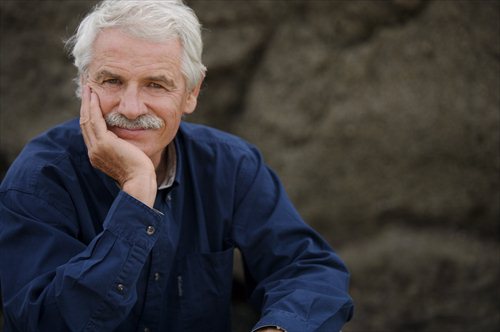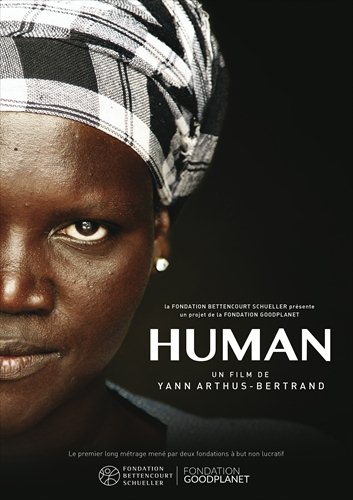The state of the human race
Yann Arthus-Bertrand to visit film festival with new documentary
On Tuesday, French filmmaker and photographer Yann Arthus-Bertrand (pictured below) will visit Shanghai for a screening of his latest documentary, Human, at the Shanghai Science and Technology Cinema (3/F, 59 Nanchang Road) for the Shanghai International Film Festival.

Photos: Courtesy of Yann Arthus-Bertrand
Last September, Human debuted at the Venice Film Festival and later was screened at the UN General Assembly Hall, including Secretary-General Ban Ki-moon in the audience.
Driven by the question "what makes us human?" Arthus-Bertrand spent three years interviewing 2,000 people across 60 countries, asking them about life basics such as love, happiness, family, peace and equality, as well as their opposites: hatred, sorrow, exile, war and discrimination.
The interviewees range from children to seniors; a life-imprisoned murderer and a wheelchair-bound traveler; the son of a former terrorist and victims of genocide; a gay man's father and a wife in polygamous family.
Ban is also interviewed, as well as Uruguay's former president José Mujica, US businessman Bill Gates and actress Cameron Diaz.
The screening's 143-minute theatrical version omits some, but an expanded version at 191 minutes is available on YouTube, which also has a series of selected portraits.
In the film, every interviewee is set against a black background, with no information about location or nationality; in this manner, the director hopes to convey the message that we're all the same as humans.
The portraits surprisingly become very powerful by their pure aura of humanity. For each interviewee, Arthus-Bertrand asks 40 questions, which often took an hour to answer. The interviews were conducted by journalists familiar with the subjects' societies.
It is Arthus-Bertrand's first film to focus on human society; he's more well-known for a series of books, photographs and films on nature.
Born in 1946, Arthus-Bertrand is a self-taught photographer and the founder of one of the world's earliest aerial photography agencies.
Most of his lifetime has been associated with environmental protection, and he set up the GoodPlanet Foundation to promote this cause to people around the world.
Also in Human, his stunning aerial photography can be seen in intervals between interviews, with panoramic landscapes and crowds of people, so beautiful that each frame qualifies as a great desktop image.
Accompanying those shots is a soundtrack from award-winning composer Armand Amar, traversing a variety of music styles from around the world with outstanding vocalists from different cultures.
In March, the film won the top prize at the European Documentary Film Festival in Oslo; the judges remarked that "Human is a tribute to life and a strong depiction of what unites us as human beings. We understand how insignificant and significant we are, at the same time - why we hate, why we love."
The Global Times (GT) interviewed the director (YAB) by phone from Paris about the process of making Human.

A poster for the documentary Human Photo: Courtesy of Erwan Sourget
GT: What prompted you to do Human?
YAB: I'm an activist. I want to change the world through cinema. When you think how the world is today, you think about the climate change, you think about the refugee problem, you think about the economic crisis. Today when you think what is going to happen in the upcoming 30 or 40 years, we're all worried about that. So I think today living together is very important. I think love is the key for everything that is going to happen in the future. And I think to try to listen to the heart of people is very important. That's why I decided to do this.
GT: What was the major challenge during the three-year production?
YAB: You know, to make a movie is a big story, because there are a lot of people working with you. You do aerial shots, and you do interviews. The challenge is to try to find the good person to speak. I always say everybody can be part of Human; surely, if I do an interview with you for one hour, you can say something amazing, because everybody has something to say, everybody is important. Nobody is more important than somebody else. So the major challenge is try to get a lot of interviewees and try to find the best one. I had amazing journalists who worked very well on it.
GT: You asked your subjects 40 questions; who designed the questionnaire?
YAB: We have been working on the questionnaire for a long time, possibly 10 years to now, and also there were some themes. When we were working on the topic of war, we don't ask the same thing as when we go for homophobia, for example. We choose the good question for the good time. When we try to work on the subject of homophobia, for example, we're more leading the interview on this problem, how to be homosexual, and how you suffer from discommunication. When we speak about war, we mostly speak about how you forgive, something like that.
GT: Besides interviews, there are some panoramic shots; how did you select those scenes, based on aesthetic value or social significance?
YAB: It's always a mix of everything. When you're a photographer, you're looking for beauty, and also you're looking for giving sense to your work. I'm completely obsessed in trying to give sense to my work, you know, the sense of life, not only beauty, but which means something. I hope people can see not only beauty, but also other things. You know, I've been an ecologist for a long time.
GT: You ask people what's their happiest moments; what about yours?
YAB: Frankly, I'm very happy when people see the movie. And they come to see me, they kiss me, they give me hug and they cry. When we do a movie like that for such a long time and people come to see, I'm very happy with that. Because we feel that the things we've done can touch people very deeply. And to touch people deeply is a privilege; it's not easy to do that. So I'm happy with that.
GT: Your next film is about women. Can you tell us more about it?
YAB: We're still looking for money to do the movie; we're supposed to begin in October. I think to be a woman in this world of men is quite difficult, and I want women to talk about that. What's a woman today, it can be in our country, and also in Africa, India and other countries. You see in some countries women have no right, and I want women to speak about that.